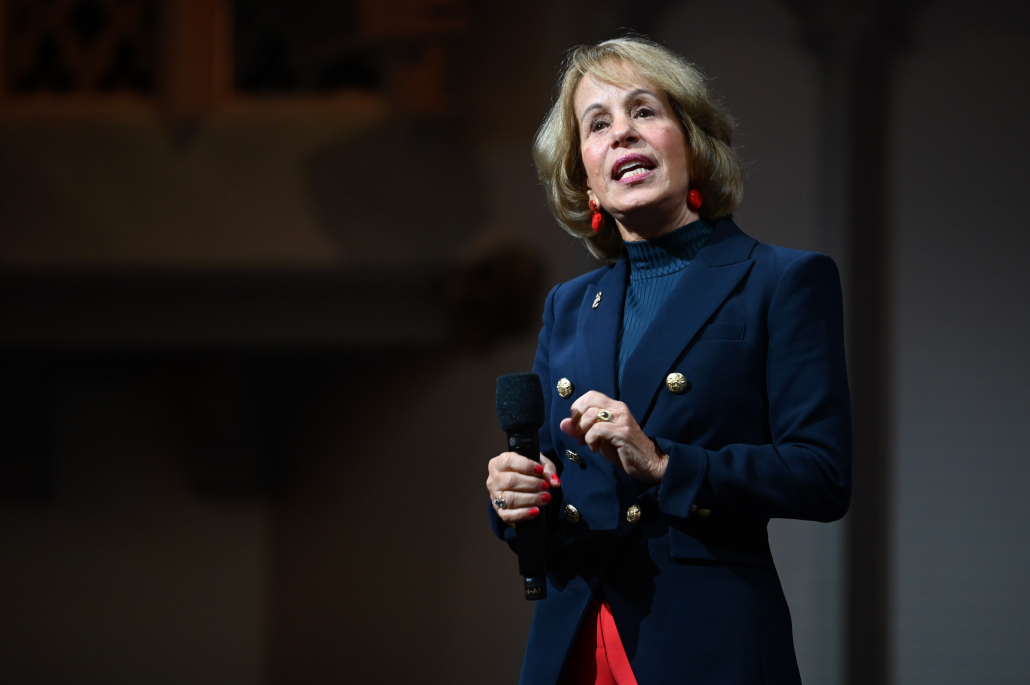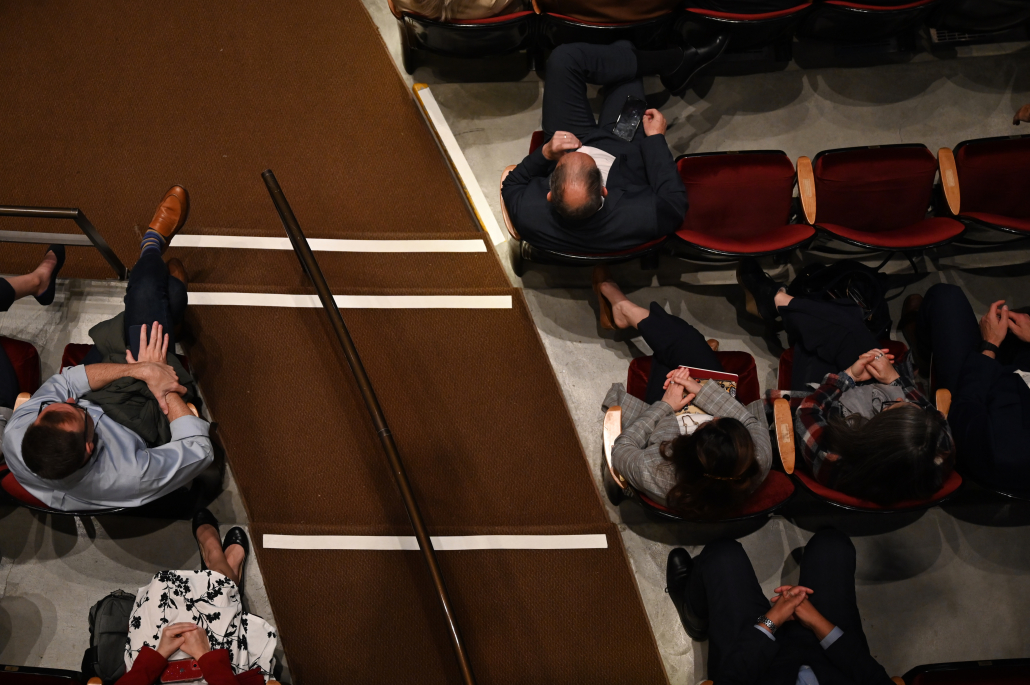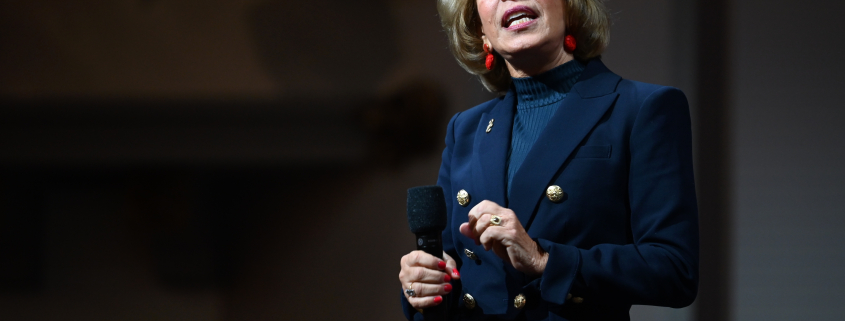Carol Folt envisions ‘limitless’ future in State of the University address

“Everything, everywhere, all at once.” Those were the words with which President Carol Folt opened her State of the University address, held early Tuesday morning at Bovard Auditorium. It was also the title of the film that swept the 95th Academy Awards, including a Best Supporting Actor win for School of Cinematic Arts alum Ke Huy Quan. Not only was “Everything Everywhere All At Once” a “mind-bending film,” Folt said, it also captured “the tenor of our times.”
“We’re really living in the proverbial winds of change, every day: shifting demographics, the need for new foundational skills, the changing nature of work, the STEM revolution,” Folt said. “These issues, and war, are really sweeping us into a swirl of confusing signals. … That swirl is also magnified in universities, because the nation’s campuses, as you all know, are on the frontline for Big Tech, societal and political issues.”
Amid continued attacks on education across the United States, such as book bans and restrictions against subjects taught in universities, Folt acknowledged USC’s privilege of not being “forced or [choosing] to go backwards in any of those areas.”
“We’ll continue to honor and support and learn from the experiences of our diverse and global communities, and we’ll support the multitude of voices and perspectives that make universities such compelling forces for change,” Folt said. “So let’s just return to thinking about everything everywhere. All at once.”
For Folt, this manifested as a 45-minute-long speech, painting USC as a distinguished research university, adept at adjusting to the rapid societal and technological changes at the turn of a new decade. Running parallel with these larger changes were changes to the University itself: USC onboarded several new leaders in the past year, including a Kaufman School of Dance dean, a Thornton School of Music dean, an inaugural vice provost for the arts, a new CEO of USC Arcadia Hospital, two new senior vice president positions and a new Department of Public Safety chief. The Student Judicial Affairs and Community Standards system also received a revamp, Folt said, to “very positive feedback” from students and faculty members.
USC faculty “continue to garner incredible national and international awards,” Folt said: 11 professors were inducted into prestigious national academies, and funding grants rose 8% in 2022 from the previous year. Of the 3,500 research proposals submitted this academic year — altogether valued at $3.5 billion — 40% were funded, significantly over the usual 10%.
“That exceptional figure places our research among the very top in the nation,” Folt said.
USC is also in a strong financial position, as it raised $770 million in pledges and gifts — “one of the top years in our history,” Folt said — and paid off nearly $2.5 billion in legacy coronavirus and legal expenses.

Folt gave a list of “moonshots,” or long-term goals, for the year. The first is continuing the USC Competes initiative, which focuses on increasing financial aid opportunities for students and competitive wages for faculty and staff. Another goal was continuing to evaluate remote work flexibility. Folt said that the University has, “for several years, added an additional week of holiday vacation at year’s end” — to great applause from the audience, a majority of which was faculty and staff.
Another moonshot was a so-called “USC 3.0” — a restructuring of the University’s health sciences programs including a new Board of Trustees, faculty growth, additional research support and the realignment of all health-related schools under Senior Vice President for Health Affairs Dr. Steve Shapiro.
Other goals Folt listed were a commitment to the athletic and academic success of student athletes, and the continuation of initiatives reducing carbon emissions.
USC’s admissions also saw significant changes this year. Almost 81,000 people applied for first-year admission, a 17% increase from last year’s pool. More than 1 in 5 students admitted to the Class of 2027 were first-generation college students; more than 1 in 3 identified as being from historically underrepresented racial or ethnic backgrounds in U.S. higher education.
“We’ve been about that diverse for about 10 years,” Folt said in response to the statistics, during a joint interview Tuesday with Annenberg Media, ATVN and the Daily Trojan. Folt referred to the First Generation Plus Success Center — established in 2020 for students who are first-generation, undocumented, transfer and former foster youth — as an example of the University’s successes in accommodating a diverse student body.
This spring was also a big semester for unionization movements. On Friday, USC shuttle drivers and dispatchers won a union election by one vote; graduate student workers also successfully unionized in February. Folt said in the joint interview that while she believed “people get to make a choice,” she herself had to “do everything possible to not put people between us.”
“I have preferred the idea that any grad student can come talk to us, that anybody can come negotiate with us; that doesn’t happen anymore,” Folt said. “We will work very carefully with [the unions] to come up with the proper agreements, but in the end, we want to continue to make sure that we have as few middle people between us — our students and our faculty and our staff — as possible.”
July marks Folt’s fourth full year as president. Folt said in her address that she was “going to feel like a senior … in the Class of 2023,” and that she hopes to leave those “four transformative wonderful years … with a sense of hope and purpose.”
“I choose to see USC’s future as limitless,” Folt said. “I hope when people think of USC, they’ll think of a place where there is excellence in everything, everywhere all at once.”
Nathan Elias contributed to this report.

